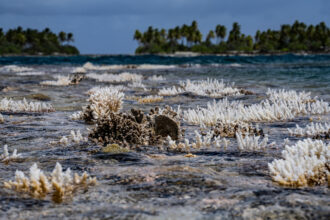At issue in a U.S. District Court hearing in Anchorage is an unpaid $92 million claim by the U.S. Justice Department and the state of Alaska for what they consider long-term environmental damage unexpected at the time of the grounding.
The claim was made five years ago under a special “reopener” provision of the governments’ 1991 civil settlement with Exxon, in which the oil company paid $900 million.
That money was paid over a decade into a trust account that funds environmental restoration projects and scientific work.
But persisting environmental impacts prompted the federal and state governments to present the reopener bill to Exxon Mobil, Exxon Corp’s successor.
The money should go to projects to address unforeseen damages, including surprising amounts of oil lingering in Prince William Sound beaches, the governments said in 2006.
Exxon has not paid the bill, and the governments have yet to take the matter to court.
Now, an Alaska environmentalist is seeking to persuade a federal judge to compel Exxon to pay the $92 million, plus another $23 million in interest.
At stake is more than money that could be used restore a Prince William Sound still injured by the 11 million gallon spill, said Rick Steiner, the retired University of Alaska marine science professor and longtime Alaska activist who filed the motion to compel the payment.
Precedent for Gulf
The outcome will be a precedent for a potential legal settlement over the Deepwater Horizon oil blowout in the Gulf of Mexico or any other environmental disaster with long-term but unknown consequences, Steiner said.
“If this reopener is not paid here and won’t be, then how in good conscience can the governments and the public and the courts settle the case down in the Gulf using a similar reopener provision?” he said.
Steiner faults the federal and state governments for being too passive about the claim, which he said should be invoked to address long-lasting damages such as the collapse of herring stocks.
“It’s really pretty outrageous that they let this languish for so long,” he said.
And he faults Exxon for refusing to pay what he considers a paltry sum compared to the oil giant’s annual profits.
The state and federal governments have not responded to Steiner’s efforts with any court documents related to his motion. But one former governor, Republican Frank Murkowski, sent a letter to the court supporting Steiner.
“Alaska deserves closure on this issue after 22 years,” Murkowski, whose administration made the reopener claim in 2006, said in his letter.
Exxon Says Enough
Exxon argued in a motion filed last week that it should not pay anything more for the Valdez disaster. No long-term impacts have been serious or surprising, so no reopener payment for unforeseen damages is justified, the company argued.
“In fact, the more than 20 years of intensive scrutiny of the Prince William Sound ecosystem by hundreds of scientists confirm that Prince William Sound and the oil spill area are in good ecological shape.
“The isolated pockets of oil residues remaining in the Sound are so effectively sheltered that they have resisted natural environmental removal for two decades,” the company said in its motion.
“The Spill reconfirmed what has long been known, that oil spills have acute dramatic effects but that they are essentially short-term events, with some isolated consequences that may persist for many years,” the company’s motion said.
Exxon says it has already spent $4.3 billion as a consequence of the spill, including cleanup costs and various legal settlements, court verdicts and criminal fines.
The governments’ civil settlement is separate from a long-running class-action lawsuit filed by Alaska fishermen, Alaska Natives, property owners and other individuals and groups affected by the Exxon Valdez spill.
Those private plaintiffs, totaling about 32,000, won more than $500 million in compensation through court verdicts and settlements and a $5 billion punitive damages fine levied against Exxon in a 1994 federal trial.
An appeals court cut that to $2.5 billion, and the U.S. Supreme Court in 2008 cut the punitive fine down to $507.5 million.
(Editing by Jerry Norton)
About This Story
Perhaps you noticed: This story, like all the news we publish, is free to read. That’s because Inside Climate News is a 501c3 nonprofit organization. We do not charge a subscription fee, lock our news behind a paywall, or clutter our website with ads. We make our news on climate and the environment freely available to you and anyone who wants it.
That’s not all. We also share our news for free with scores of other media organizations around the country. Many of them can’t afford to do environmental journalism of their own. We’ve built bureaus from coast to coast to report local stories, collaborate with local newsrooms and co-publish articles so that this vital work is shared as widely as possible.
Two of us launched ICN in 2007. Six years later we earned a Pulitzer Prize for National Reporting, and now we run the oldest and largest dedicated climate newsroom in the nation. We tell the story in all its complexity. We hold polluters accountable. We expose environmental injustice. We debunk misinformation. We scrutinize solutions and inspire action.
Donations from readers like you fund every aspect of what we do. If you don’t already, will you support our ongoing work, our reporting on the biggest crisis facing our planet, and help us reach even more readers in more places?
Please take a moment to make a tax-deductible donation. Every one of them makes a difference.
Thank you,











